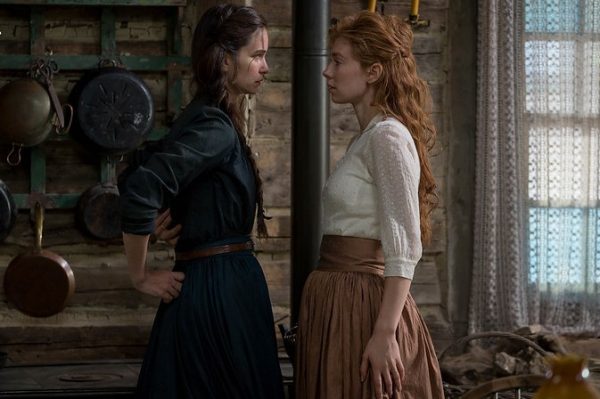A period romance with the trappings of the 19th century epistolary novel, Mona Fastvold’s second feature is a lesbian love story that never quite escapes the constricting stays of its framing. The World to Come is a frequently beautiful and occasionally captivating film. Yet a constant wistful but dour voiceover seeps into the pores of the frame like woodwork, leaving the audience as yearning and unfulfilled as the Emily Dickinson poems that our main protagonist Abigail (Katherine Waterston) comes to resemble. Unfortunately, it tells far more than it shows.
Abigail and her husband Dyer (Casey Affleck) are struggling to maintain a small farm and a distant marriage. Diphtheria has clamed their daughter and they begin 1856, ‘with little pride, and no hope,’ as Abigail writes in her diary. Abigail’s existence is lightened considerably in the for of Tallie (Vanessa Kirby), a vibrant young woman who has rented a plot nearby with her husband Finney (Christopher Abbott). The two women bond straight away and become inseparable, to the growing concern of their disapproving husbands.
The setting of The World to Come is a potent one, as geared to horror as it is romance – Emma Tammi‘s supernatural chiller The Wind sprouts from similar seeds – with the potential for tragedy encased as hard as permafrost. The frontier setting, as well as the hyper-literary style, sets it firmly in mythic territory. This is no surprise when Ron Hansen, the writer of The Assassination of Jesse James by the Coward Robert Ford, is involved in the script. The narration also offers ample opportunity for the narrative to expand in interesting ways which it never explores. As we experience the story so firmly from Abigail’s subjective point of view, there could have been more nuance or ambiguity in her version of events. However, we’re never given any indication that her version is anything but gospel.
None of this is the fault of Waterston and Kirby, who portray the connection between the women with depth and believability, particularly in the sweetly tentative early stages of their attraction. Abigail begins the story in so much torment that the the colours of her world are desaturated almost to the point of monochrome. When she meets Tallie towards the end of February it’s difficult to tell if the sudden daylight is from approaching Spring or Tallie’s sheer vibrancy. The two are alive when together, in a way that can spell nothing but tragedy. With liberation comes carelessness, and their husbands may be taciturn, controlling, and aggressively patriarchal, but stupid they aren’t.
Fastvold sublimates this passion for the most part, giving us mere glimpses of the passion the women feel for each other, teased from the coy pages of Abigail’s diary. Literally carrying on their affair away from the male gazes of their husbands, and largely from the audience. It is only in a last minute burst of reverie that Abigail gives the viewers a sudden rush of the joyous abandon and physical intimacy that she had previously withheld. It bookends everything neatly in its epistolary frame, but once again relies on the cumbersome narration which keeps everything at a slightly academic, intellectual remove. It ultimately leaves The World to Come as a film about passion that never quite cuts through the pervasive chill of its frigid frontier setting.
Screened as part of Sundance Film Festival 2021
